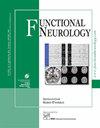从运动到思维再回来:认知因素影响技术神经康复的作用综述。
Q2 Medicine
Functional neurology
Pub Date : 2019-07-01
引用次数: 0
摘要
近年来,认知理论对运动康复的影响越来越大。认知和运动功能的不同方面之间的联系越来越多地被记录下来,强调了开发考虑认知方面的康复项目的重要性。这篇非系统综述的目的是强调认知和运动之间的关系,并根据新的康复技术,更好地定义认知方面如何影响运动康复。本文章由计算机程序翻译,如有差异,请以英文原文为准。
From movement to thought and back: a review on the role of cognitive factors influencing technological neurorehabilitation.
In recent years, cognitive theories have increasingly influenced the approach to motor rehabilitation. The connection between different aspects of cognitive and motor function is increasingly documented, underlining the importance of developing rehabilitation projects that take cognitive aspects into account. The aim of this non-systematic review is to highlight the relationship between cognition and motion and, in the light of new rehabilitation technologies, to better define how aspects of cognition can affect motor rehabilitation.
求助全文
通过发布文献求助,成功后即可免费获取论文全文。
去求助
来源期刊

Functional neurology
医学-神经科学
CiteScore
3.90
自引率
0.00%
发文量
0
审稿时长
>12 weeks
期刊介绍:
Information not localized
 求助内容:
求助内容: 应助结果提醒方式:
应助结果提醒方式:


